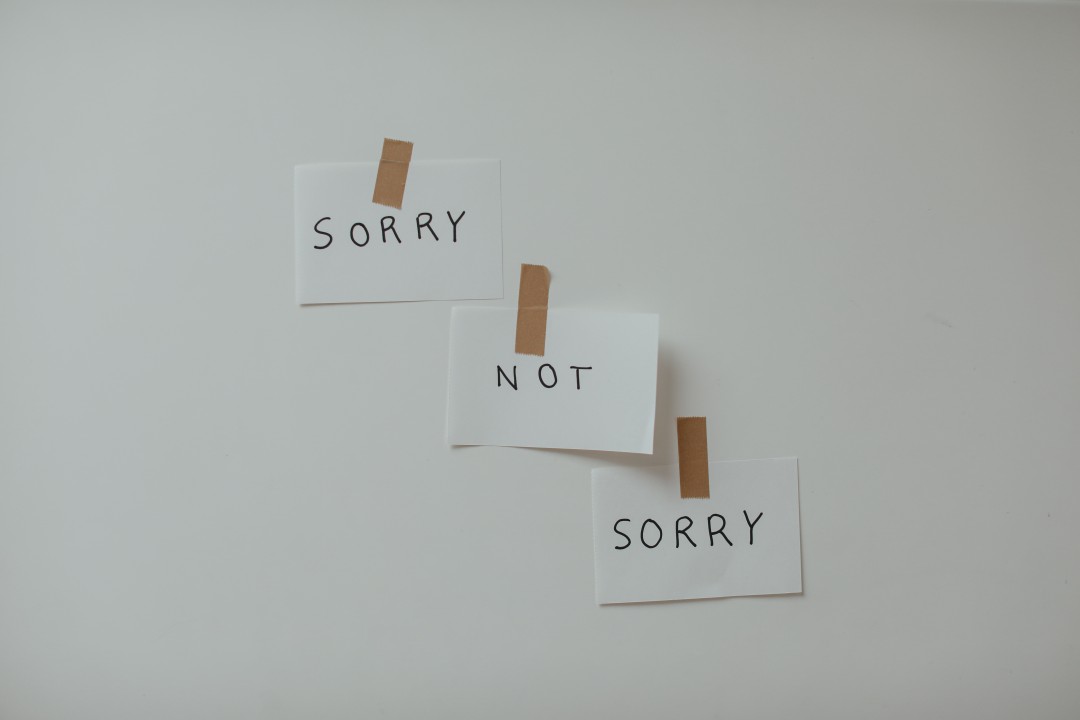
"I’m sorry you apologise that way": why accountability will always trump a non-apology
Has anyone ever said to you – ‘I’m sorry you feel that way’ when they’ve done something wrong?
Has it ever made the situation better?
No, I thought not.
This kind of non-apology is bafflingly widespread, and I think it comes down to a misplaced fear of accountability.
So what got me thinking about accountability? It all started with a house move.
House moving (buying and selling simultaneously in my case) is possibly England's greatest shame. You get no security or reassurance until literally days before you actually move, and you rely entirely on your conveyancer, who is the gate keeper of all progress.
The other day, I was speaking with my conveyancing solicitor about a number of errors she’d made in the pre-exchange documents we had to sign. As a qualified lawyer, I read everything before I sign it - but these mistakes didn't need a law degree to spot.
They weren’t small errors. They were things like us confirming we’d ignored ‘strong advice’ against exchanging (that we'd never been given), or instructing them to abandon enquiries (which we'd never done), or confirming that we’d instructed them not to get searches (that we’d received already), or stating that our deposit was coming from a third party (when it was coming directly from us). I hoped it was one of those situations where you accidentally upload an earlier draft and she was going to say 'oops, oh my gosh that's not the one for you to sign, here's the right document for you' and all would be well.
That didn't happen.
She refused to acknowledge the errors at all. She just wouldn't answer any questions that would lead to her having to acknowledge this, so we ended up having the most bizarre conversation where she'd answer a totally different question. I felt like Jeremy Paxman.
She refused to accept any responsibility.
She told us that rewriting the document would take ‘weeks’ and would cost us a lot more money.
And she said the dreaded ‘I’m sorry you feel that way’ when I said I was disappointed with her response.
At no time in our conversation did she say or do anything to help move the situation forward. We ended the call feeling more frustrated than when we’d started it.
Of course her mistakes reflected badly on her, but it was her lack of accountability that took the biscuit.
She was clearly terrified of acknowledging her mistake.
What she didn’t seem to realise is that acceptance of responsibility can be miraculously healing in difficult situations.
I recall the time I made my very first workplace mistake. I was working as a fresh-faced law graduate with the Australian Attorney-General’s Department. One of the best things about that job is that they threw you in the deep-end. We had big jobs to do and not a lot of oversight on them.
I’d been given a big international legislative update to do. It was a complex piece of work that I’d been working on for about six months and I had worked my socks off on it. I thought I’d rocked it...
…right up until the Minister for Justice and Custom’s Chief of Staff asked me, half-way through the amendment’s first reading in the Commons to give him the second reading speech. Gulp. The green walls of the room shimmied a little.
I didn’t know they would need that so early. I thought there’d be time between first and second reading, so it was on a later to-do list. I hadn’t checked or asked – and I should have. I had messed up. I immediately started writing the second reading speech in a notebook I had to hand, and hoped I'd have time to finish it before the Minister was called up to speak again.
The second reading was deferred at the last moment, but the second we walked out of the Commons, the Chief of Staff whirled on me and demanded to know why there was no speech.
“It’s my fault,” I said, (hoping the floor would open up and swallow me). “I’m really sorry, I didn’t realise it would be needed tonight. I should have known this and there’s no excuse that I didn’t find out in advance. It will never happen again. I will go and write it immediately.”
He looked at me with bemusement. The anger flowed out of his body. And he seemed honestly baffled that I hadn’t reacted defensively.
He gruffly said something about getting it done. I did, it all went through, and to this day I still prepare everything in advance, just in case.
That was the first time I made a mistake at work, and of course it wasn’t the last. Nobody likes making mistakes, but we’re all human and it happens. As a leader, I always try to focus on either how to fix a mistake, or how to learn from a mistake. I don’t berate people for mistakes as it is totally counterproductive. If there’s no accountability, however, there’s something to talk about.
We all have to be better at being accountable. At taking responsibility, owning our mistakes and committing to learn from them.
If we’ve let someone down, they will be having a reaction to it – whether emotional or otherwise. We have to be able to acknowledge that reaction and our role in it to enable us to move ahead to a solution. Ignoring the impact we’ve had on others is only going to increase that reaction – not decrease it.
So I appeal to you – never tell someone that you’re sorry they feel that way (or if you do, do so in the knowledge that you are deliberately winding them up).
Be accountable. You might find it works wonders.